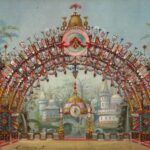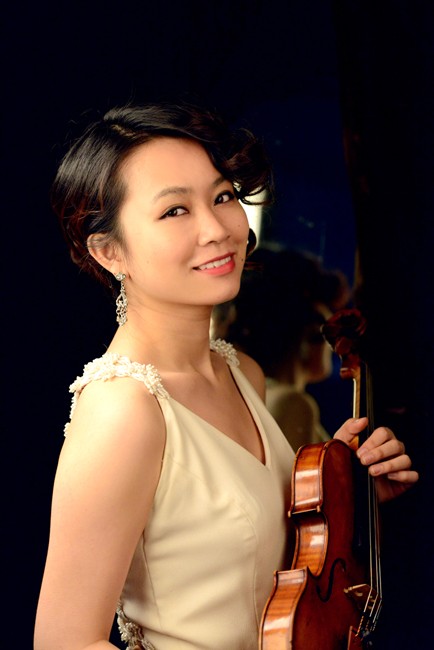Bard Conservatory Orchestra
The Nutcracker
A Symphonic Performance
December 3, 2022
Bard Conservatory Orchestra
December 3, 2022


Bard’s Conservatory Orchestra performs a symphonic concert of Pyotr Tchaikovsky’s The Nutcracker, conducted by Leon Botstein. Join us for chance to revel in Tchaikovsky’s most festive and magical scores. Also featured on this program is Carpathian Rhapsody. Composed by Ukrainian composer and teacher Myroslav Skoryk, the piece will be performed by violinist and Bard Conservatory Faculty member Luosha Fang ’11.
The Bard Conservatory Orchestra
Leon Botstein, music director
Carpathian Rhapsody (2005)
Myroslav Skoryk (1938–2020)
Luosha Fang ’11, violin
The Nutcracker, Op. 71 (1892)
Pyotr Ilyich Tchaikovsky (1840–93)

Violin
Any concerns about Pyotr Ilyich Tchaikovsky’s “cancellation” due to the present-day Russian war of aggression against Ukraine should be quelled by now, as the winter holiday season commences, and we find Tchaikovsky’s Nutcracker as ubiquitous as ever. But these concerns were always disingenuous (not least because our established canons are so entrenched as to be immovable), and serious challenges to them are almost always voiced from the margins—in this case, by Ukrainian voices historically marginalized by the dynamics of Russian, and then Russocentric Soviet, imperialism. An enchanting winter story, The Nutcracker’s sumptuous melodicism and seductive exoticisms summon warm feelings among much of the listening public.
Many scholars have noted that the fiery “Russian Dance” of The Nutcracker draws upon a vernacular dance-music form known as the trepak (in Russian), or the tropak (in Ukrainian). Yet Tchaikovsky names it, simply, the “Russian Dance.” This decision can be interpreted in many ways. I will offer two. First, charmingly, Tchaikovsky melds into a new synthesis aspects of his own hybrid heritage (his paternal lineage stems from Zaporizhian Kozak warriors who conducted the first experiments in establishing an anti-imperial Ukrainian state). This kind of musical hybridization is an ordinary compositional achievement; but in Tchaikovsky’s hands, and with the Russian PR machine behind him, it has come to exemplify some of the “greatness” of Tchaikovsky as a Russian composer par excellence.
But another, darker, possibility is that the erasure of distinction between Russian and Ukrainian is a standard settler-colonial technique of assimilation and elimination, that Tchaikovsky’s was an appropriative act of “love and theft,” an act that blurs the distinctions between the colonizer and the colonized. I realize this is a provocation, perhaps one especially unpalatable during the season of sugar plum fairies and holiday cheer, and perhaps more easily dismissed for being voiced by a scholar of Ukrainian music with a Ukrainian surname. Nevertheless, I suggest that as we bear witness to Russia’s neoimperialist war currently escalating half a world away, we give some consideration to the second interpretation.
—Maria Sonevytsky, Associate Professor of Anthropology and Music, with gratitude to Teryn Kuzma VAP ’23
When it was announced that the Bard Conservatory Orchestra was planning to perform Pyotr Ilyich Tchaikovsky’s Nutcracker this December, Teryn Kuzma VAP ’23, who has family and roots in Ukraine, raised with me the issue of whether this was appropriate, given Russia’s aggression against Ukraine and the death and destruction the war has visited on that country and its population. I am grateful to Teryn for bringing up the matter. It sparked a dialogue of the kind that is needed and that should be integral to a community of learning defined by freedom, debate, and tolerance. As a result of her intervention, we decided to open the program with a piece by Myroslav Skoryk (1938–2020), a major Ukrainian composer, as a sign of our solidarity with Ukraine, and include in the concert program a note both from Professor Maria Sonevytsky, our distinguished colleague, and from me.
The questions Teryn poses are central to our work as performing artists. They are not new.
First, to what extent are writers, painters, and composers from the past— particularly from a more distant past (as in the case of Tchaikovsky, who died in 1893)—and their works (his Nutcracker is 130 years old) inevitably tarnished by the criminality and brutality of regimes and their supporters who represent the “same” nationality in the present? Furthermore, is Tchaikovsky’s Nutcracker really an emblem of Russia, Russian nationalism, or even Russianness? Has it ever been?
Second, what do we make of the widespread habit of composers throughout history to integrate disparate and foreign traditions into their music, including many composers (among them Mozart and Beethoven) who worked under regimes and for rulers and patrons possibly worse than the ones we have now? Should we, for example, walk away from one of the most famous pieces for cello, Max Bruch’s Kol Nidre, because it uses the most sacred tune in the Jewish tradition and distorts it using a secular Romantic aesthetic? Bruch was not Jewish. He was a German Protestant who harbored anti-Semitic sentiments. He was favored by the state as a composer and musician in Wilhelmine Germany, where Jews suffered extensive and oppressive official and populist discrimination.
One can put the problem in even sharper focus. The Jewish victims of the Holocaust who were musicians and music lovers did not abandon Beethoven, Bach, Brahms, and other aspects of German musical heritage during World War II. As victims, they knew who was responsible for Auschwitz and the Final Solution. The composers who worked in German-speaking Europe well before 1933, and formed the European cultural heritage cherished by Jews, may have harbored anti-Semitic prejudices, but they were certainly not Nazis, and not complicit in the murder of six million innocent human beings.
These composers of the past did not write music to incite killing. Not even Wagner, who was an influential anti-Semitic polemicist, and who has been frequently cited as a precursor of the Nazis. The victims clung to the hope that art and culture could resist the evils of nationalism and hate. Therefore, those who suffered the most asserted their connection to a great artistic heritage with exceptional pride as a sign of their shared humanity and dignity. The victims’ advocacy of the “German” musical tradition became a necessary antidote to the Nazi regime’s intensive effort to appropriate German musical and literary culture of the past on behalf of their ideology of hate, dictatorship, and violence.
This is a challenge we face today. Tchaikovsky is not to blame for Putin’s policy and is not responsible for Putin’s effort to distort his musical achievement so that it might appear to support the violent and racist aims of the current Russian government. The Nutcracker was based on a German literary text by E. T. A. Hoffmann, mediated by the French writer Alexandre Dumas. Tchaikovsky may have enjoyed the patronage of a cruel czarist Imperial regime and its aristocracy that oppressed minorities and exploited its Russian subjects, but he wrote a work of uncommon beauty that has captivated the public as few works have.
The Nutcracker has escaped the historical prison of its creation. Furthermore, its success is not an emblem of “Russianness.” Rather, it has become a treasured possession of dance and music lovers worldwide for generations. The special potential of instrumental music is that its original historical context is easier to shed, allowing it to gain unexpected meanings.
This has happened with The Nutcracker and, in fact, with a great deal of Tchaikovsky’s music. He was invited to open Carnegie Hall in 1891 not because he was “Russian” but because he was considered, if not the greatest living composer in the world, one of the top two or three. In my opinion, his music in this score reveals no “theft,” as my friend and colleague Maria Sonevytsky suggests, any more than Bruch’s use of the Yom Kippur liturgy was “theft.” Most of the cross-cultural borrowings throughout the history of music were actually acts of love.
At the same time, it is right that we remember the colonial attitude toward and cruel treatment of Ukraine in Russian history. Uncomfortable truths that link past and present ought not to remain hidden. But it is equally right to resist condemning those long dead for the crimes of the present, and judging them by today’s criteria. Let us concentrate on fighting back tyrannical governments and authoritarian regimes today that wage war on others and oppress minorities. In that struggle we must defeat the hijacking of historic cultural traditions or works of art in the service of a violent and exclusionary nationalism. A work that has moved the hearts of millions all over the world for more than a century deserves a better fate.
I wish to thank Teryn, Maria, and all my colleagues at the Conservatory, particularly the members of the Bard Conservatory Orchestra.
I wish everyone a happy and healthy holiday season.
—Leon Botstein, Music Director, Bard Conservatory Orchestra
Nearby villages and towns in the Hudson Valley boast a large selection of restaurants, as well as a variety of hotels, motels, inns, and bed & breakfasts.
Eat & StayBard College’s main campus is located in Annandale-on-Hudson (a hamlet of Red Hook), New York, on the east bank of the Hudson River, about 90 miles north of New York City and 220 miles southwest of Boston. The Taconic State Parkway and the New York State Thruway provide the most direct routes to our campus. Click the Google map below, or get directions by entering the following address into your GPS: 60 Manor Avenue, Red Hook, NY 12571.
From the East
If you are traveling from east of the Hudson River in New York State, take the Taconic State Parkway to the Red Hook / Route 199 exit, drive west on Route 199 through the village of Red Hook to Route 9G, turn right onto Route 9G, drive north 1.9 miles, turn left onto Annandale Road, then turn right onto Manor Ave.
From the West
If you are traveling from west of the Hudson River, take the New York State Thruway (I-87) to exit 19 (Kingston), take Route 209 (changes to Route 199 at the Hudson River) over the Kingston-Rhinecliff Bridge to Route 9G, turn left onto Route 9G, drive north 3.5 miles, turn left onto Annandale Road, then turn right onto Manor Ave.
Sosnoff Theater
Accessible Seating
Wheelchair-accessible seating is available in all seating areas for patrons in wheelchairs and their companions. There is an elevator to all levels of the Sosnoff Theater and a wheelchair lift is used to access front-row wheelchair seating.
Wheelchair-Accessible Restrooms
Restrooms at all locations are wheelchair accessible. Single-use restrooms are available at most locations.
All-Gender Restrooms
Bard College and the Fisher Center support guests of any gender identity/expression in using the restroom of their choice. Additionally, all-gender restrooms are available at all venues.
Our driving principle is to operate with a duty of care for all our community—artists, audiences, and staff alike.
In order to share performances with as many audience members as possible, we ask that you read our Health and Safety Protocols on the FAQs page and commit to participating in our community of care.
Read the FAQs and Safety Protocols